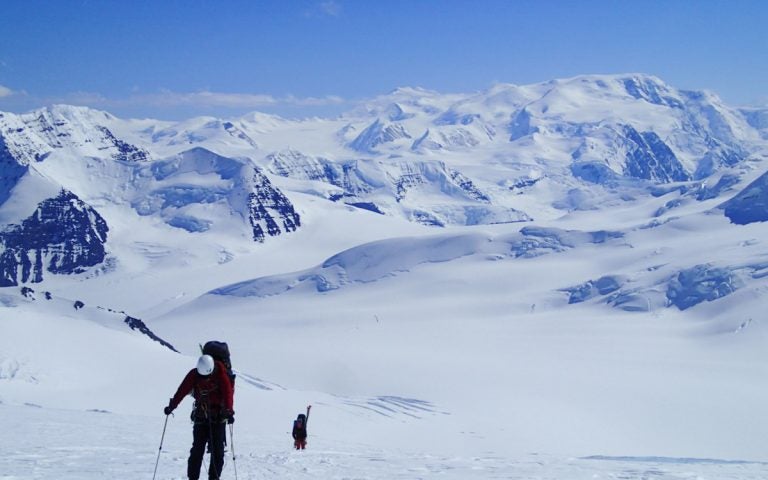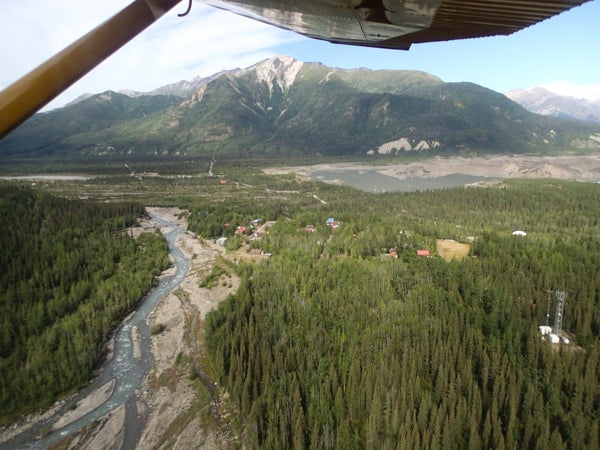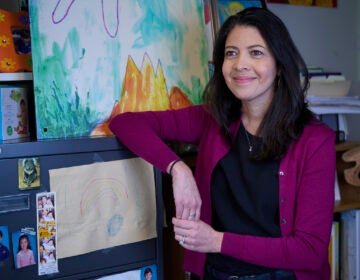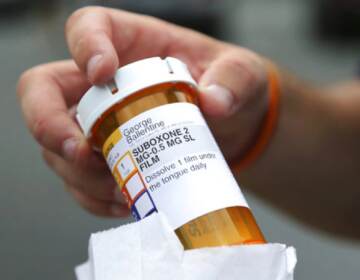Before Huntington’s: Seeking adventure while she’s able
Dogged by the specter of a disorder that feels like genetic destiny, a woman challenges her body and mind to do new things.
Listen 8:14
A photo from Lucy’s time in Alaska. (Courtesy of Lucy)
Huntington’s Disease can rob you of your physical independence and your ability to think clearly.
There’s no cure. It’s fatal. And the destruction to the brain and the body is achingly slow. The genetic disorder often does its damage over 10, or even 25, years
“You could very well die of something else first. You could get hit by a bus.”
That’s what a woman we’re calling “Lucy” says she heard when she was first diagnosed with Huntington’s, which runs in her family.
“Which always fascinates me — that all the neurologists I’ve talked to say that as the happiest thing: ‘Well … don’t rely too much on these test results. You could get hit by a bus!'” she says. “And they sound so happy when they say that, which I’ve never understood.”
Lucy asked us to use a pseudonym to protect her identity. She’s afraid that revealing her diagnosis might hurt her chances of getting health insurance in the future.
The illness breaks down nerve cells in the brain, and it can cost thousands of dollars to care for.
“My grandmother would fall all the time,” Lucy says. “She’d fall on curbs, and she’d fall in the bathroom, and it was getting worse and worse. She looked real beat up a fair amount of the time.”
She continues: “And other people in the family had these similar things going on. In the ’90s they figured out what it was, but it just wasn’t something we talked about as a family.”
When Lucy learned about the Huntington’s in her family, she looked on YouTube and found videos of people living with advanced disease. Their bodies were nearly taken over by constant, involuntary movements called chorea, as in “choreography.” She says the movements were endless and eerie. Other people had wild emotional swings and tremendous difficulty holding a conversation. Many people in the videos were emaciated and bedridden.
Lucy decided to get tested. Her father also has the Huntington’s gene, which meant she had a 50-50 chance of having it, too.
She wanted to find out her status as soon as possible.
“I need to know now, because it’s something that’s in every cell,” Lucy says. “I couldn’t look at my hands or I couldn’t look at, you know, my skin, and not think, ‘Well, you know, that cell knows.’ And if I knew how to read it right, then I would know too.”
After meeting with a neurologist and a genetic counselor, Lucy had to get approval from a psychologist before getting blood drawn. That step is a precaution, because there’s a spike in suicide risk for people who find out they have the Huntington’s gene. It means they’ll definitely get the illness; they just don’t know when.
Then, after all that, it took 10 weeks for Lucy to find out the verdict.
“My best friend flew out, and we went and got the results. And I did have it. I did have the gene,” Lucy says.
One doctor’s comments were baffling to her — and not particularly helpful.
“He said something about we don’t have any treatments, but I hear blueberries are good for the brain, and you know, dark chocolate, antioxidants. And I’m like: This is, this is what I’m hearing from a neurologist, is what you’d get from, you know, like, your great-aunt, forwarding you online: Eat lots of blueberries! Eat dark chocolate! That’ll save your brain!” Lucy says.
“When the neurologist told me, I was actually, I was relieved. The knot in my stomach disappeared. And that was like, for a half-second, that was a wonderful feeling! Because I wasn’t waiting anymore, I knew.”
But soon Lucy realized that she had to wait for something else — symptoms to appear.
She was just 23. So, over the next eight years, Lucy finished law school. She got a job at a big law firm, paid off her student loans.
Then, after a vacation to Alaska, everything changed.
“I fell in love with the place immediately. I would say almost impossible not to. Snow-capped mountains, beautiful lakes and streams, ridiculous wildlife everywhere,” she says.

In Alaska, Lucy felt strong and adventurous. So she moved there to become a glacier guide. She decided this was a better way to spend her able life. One day she went mountaineering with a group of other guides. They set up base camp on Mount Bona at an elevation of 10,000 feet. After a few days there, the group continued on to the next camp, at about 12,000 feet.
The scenery was icy and beautiful.
But then, “the next day, going up to high camp at 14, 500 feet was when altitude sickness really started,” she says.
“We were making our way up. I was kind of out of my head a little bit. I can’t do a good job of describing what it would be like to have Huntington’s when your mind starts going. That’s something I’ve thought a lot about and will continue to think a lot about — you know, how it impacts your mind and your ability to think on things and whether it’s still your mind, really.”
The experience shook her.
“Theoretically, I can handle the idea of losing my balance, of losing my muscle control, of not being able to take care of myself physically. But the idea of losing myself mentally is terrifying,” Lucy says.
“And as we got higher and higher, with the altitude sickness, I — it was just this weird, fuzzy brain space where I couldn’t make decisions, and I couldn’t focus long enough. Like I knew I needed to do something. I knew I needed to eat, but I couldn’t make that decision to eat. And I couldn’t force myself to drink.”
So Lucy stayed at high camp as the others made the final trek to the summit.
Lucy had gone to Alaska in part to get away from thinking about Huntington’s. But that struggle on the mountain was like meeting her genetic destiny years early.
“I’ve given myself a preview of what it looks like to be in a brain that can’t think the way I’m used to being able to think, and that part was … I was terrified. I have no intentions of going over 14,000 feet ever again, however wonderful the adventure was,” Lucy says.
Still, Lucy says she’s glad she challenged herself.
“Moving to Alaska and pushing myself in those directions, it was a way to assert something about myself that wasn’t Huntington’s,” she says.
Nine and a half years after her diagnosis, Lucy is still symptom free. She wants to do a lot of things while she’s able. Adventuring in Alaska was one. Now she’s moved to the Lower 48 to pursue another dream — a master’s of fine arts degree in creative writing.
—
The original version of this story appeared on the HumaNature podcast.
WHYY is your source for fact-based, in-depth journalism and information. As a nonprofit organization, we rely on financial support from readers like you. Please give today.






